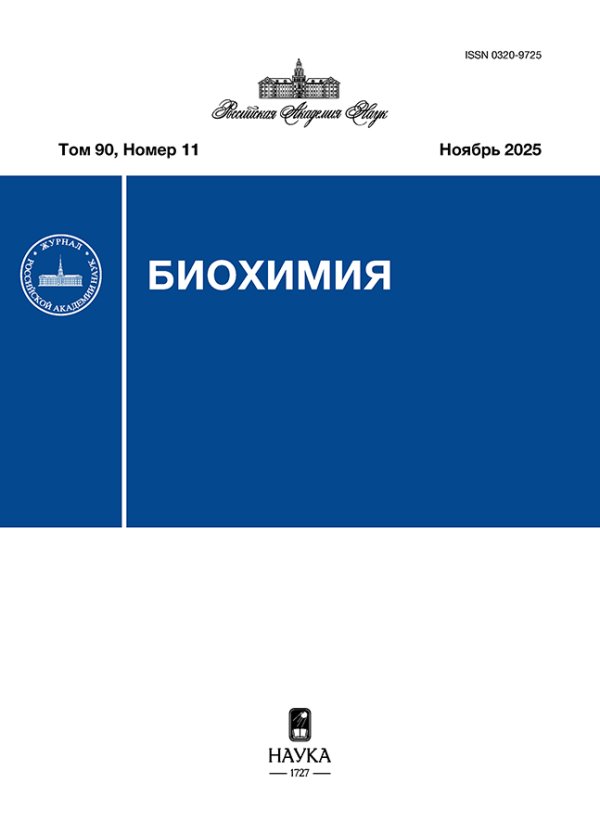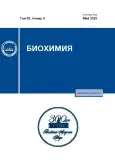Recombinant human cyclophilin A in combination with adoptive T cell therapy improves the efficacy of cancer immunotherapy in experimental models in vivot;
- Authors: Kalinina A.A1, Kazansky D.B1, Khromykh L.M1
-
Affiliations:
- N.N. Blokhin National Medical Research Center of Oncology, Ministry of Health of the Russian Federation
- Issue: Vol 88, No 5 (2023)
- Pages: 725-736
- Section: Articles
- URL: https://journals.rcsi.science/0320-9725/article/view/144668
- DOI: https://doi.org/10.31857/S0320972523050020
- EDN: https://elibrary.ru/AXIUIK
- ID: 144668
Cite item
Full Text
Abstract
About the authors
A. A Kalinina
N.N. Blokhin National Medical Research Center of Oncology, Ministry of Health of the Russian Federation
Email: aakalinina89@gmail.com
115478 Moscow, Russia
D. B Kazansky
N.N. Blokhin National Medical Research Center of Oncology, Ministry of Health of the Russian Federation
Email: aakalinina89@gmail.com
115478 Moscow, Russia
L. M Khromykh
N.N. Blokhin National Medical Research Center of Oncology, Ministry of Health of the Russian Federation
Email: aakalinina89@gmail.com
115478 Moscow, Russia
References
- Met, Ö., Jensen, K., Chamberlain, C., Donia, M., and Svane, I. (2019) Principles of adoptive T cell therapy in cancer, Semin. Immunopathol., 41, 49-58, doi: 10.1007/s00281-018-0703-z.
- Zhang, H., and Chen, J. (2018) Current status and future directions of cancer immunotherapy, J. Cancer., 9, 1773-1781, doi: 10.7150/jca.24577.
- Zhao, Q., Jiang, Y., Xiang, S., Kaboli, P., Shen, J., Zhao, Y., Wu, X., Du, F., Li, M., Cho, C., Li, J., Wen, Q., Liu, T., Yi, T., and Xiao, Z. (2021) Engineered TCR-T cell immunotherapy in anticancer precision medicine: pros and cons, Front. Immunol., 12, 658753, doi: 10.3389/fimmu.2021.658753.
- June, C., O'Connor, R., Kawalekar, O., Ghassemi, S., and Milone, M. (2018) CAR T cell immunotherapy for human cancer, Science, 359, 1361-1365, doi: 10.1126/science.aar6711.
- Mescher, M., Popescu, F., Gerner, M., Hammerbeck, C., and Curtsinger, J. (2007) Activation-induced non-responsiveness (anergy) limits CD8 T cell responses to tumors, Semin. Cancer Biol., 17, 299-308, doi: 10.1016/j.semcancer.2007.06.008.
- William, Y., Ho, C., and Greenberg, P. (2002) Adoptive therapy with CD8+ T cells: it may get by with a little help from its friends, J. Clin. Invest., 110, 1415-1417, doi: 10.1172/JCI17214.
- Srivastava, S., and Riddell, S. (2018) Chimeric antigen receptor T cell therapy: challenges to bench-to-bedside efficacy, J. Immunol., 200, 459-468, doi: 10.4049/jimmunol.1701155.
- Yamamoto, T., Lee, P., Vodnala, S., Gurusamy, D., Kishton, R., Yu, Z., Eidizadeh, A., Eil, R., Fioravanti, J., Gattinoni, L., Kochenderfer, J., Fry, T., Aksoy, B., Hammerbacher, J., Cruz, A., Siegel, R., Restifo, N., and Klebanoff, C. (2019) T cells genetically engineered to overcome death signaling enhance adoptive cancer immunotherapy, J. Clin. Invest., 129, 1551-1565, doi: 10.1172/JCI121491.
- Chandran, S., Somerville, R., Yang, J., Sherry, R., Klebanoff, C., Goff, S., Wunderlich, J., Danforth, D., Zlott, D., Paria, B., Sabesan, A., Srivastava, A., Xi, L., Pham, T., Raffeld, M., White, D., Toomey, M., Rosenberg, S., and Kammula, U. (2017) Treatment of metastatic uveal melanoma with adoptive transfer of tumour-infiltrating lymphocytes: a single-centre, two-stage, single-arm, phase 2 study, Lancet Oncol., 18, 792-802, doi: 10.1016/S1470-2045(17)30251-6.
- Veatch, J., Lee, S., Fitzgibbon, M., Chow, I., Jesernig, B., Schmitt, T., Kong, Y., Kargl, J., Houghton, A., Thompson, J., McIntosh, M., Kwok, W., and Riddell, S. (2018) Tumor-infiltrating BRAFV600E-specific CD4+ T cells correlated with complete clinical response in melanoma, J. Clin. Invest., 128, 1563-1568, doi: 10.1172/JCI98689.
- Berraondo, P., Sanmamed, M., Ochoa, M., Etxeberria, I., Aznar, M., Pérez-Gracia, J., Rodríguez-Ruiz, M., Ponz-Sarvise, M., Castañón, E., and Melero, I. (2019) Cytokines in clinical cancer immunotherapy, Br. J. Cancer, 120, 6-15, doi: 10.1038/s41416-018-0328-y.
- Choudhry, H., Helmi, N., Abdulaal, W., Zeyadi, M., Zamzami, M., Wu, W., Mahmoud, M., Warsi, M., Rasool, M., and Jamal, M. (2018) Prospects of IL-2 in cancer immunotherapy, Biomed. Res. Int., 2018, 9056173, doi: 10.1155/2018/9056173.
- Rosenberg, S., Yang, J., White, D., and Steinberg, S. (1998) Durability of complete responses in patients with metastatic cancer treated with high-dose interleukin-2: identification of the antigens mediating response, Ann. Surg., 228, 307-319, doi: 10.1097/00000658-199809000-00004.
- Nguyen, L., Saibil, S., Sotov, V., Le, M., Khoja, L., Ghazarian, D., Bonilla, L., Majeed, H., Hogg, D., Joshua, A., Crump, M., Franke, N., Spreafico, A., Hansen, A., Al-Habeeb, A., Leong, W., Easson, A., Reedijk, M., Goldstein, D., McCready, D., Yasufuku, K., Waddell, T., Cypel, M., Pierre, A., Zhang, B., Boross-Harmer, S., Cipollone, J., Nelles, M., Scheid, E., Fyrsta, M., Lo, C., Nie, J., Yam, J., Yen, P., Gray, D., Motta, V., Elford, A., DeLuca, S., Wang, L., Effendi, S., Ellenchery, R., Hirano, N., Ohashi, P., and Butler, M. (2019) Phase II clinical trial of adoptive cell therapy for patients with metastatic melanoma with autologous tumor-infiltrating lymphocytes and low-dose interleukin-2, Cancer Immunol. Immunother., 68, 773-785, doi: 10.1007/s00262-019-02307-x.
- Kalinina, A., Silaeva, Yu., Kazansky, D., and Khro-mykh, L. (2019) The role of recombinant human Cyclophilin A in the antitumor immune response, Acta Naturae, 11, 63-67, doi: 10.32607/20758251-2019-11-2-63-67.
- Nigro, P., Pompilio, G., and Capogrossi, M. (2013) Cyclophilin A: a key player for human disease, Cell Death Dis., 4, e888, doi: 10.1038/cddis.2013.410.
- Khromykh, L., Kulikova, N., Anfalova, T., Muranova, T., Abramov, V., Vasiliev, A., Khlebnikov, V., and Kazansky, D. (2007) Cyclophilin A produced by thymocytes regulates the migration of murine bone marrow cells, Cell. Immunol., 249, 46-53, doi: 10.1016/j.cellimm.2007.11.002.
- Xu, Q., Leiva, M., Fischkoff, S., Handschumacher, R., and Lyttle, C. (1992) Leukocyte chemotactic activity of cyclophilin, J. Biol. Chem., 267, 11968-11971.
- Dawar, F., Xiong, Y., Khattak, M., Li, J., Lin, L., Mei, J. (2017) Potential role of cyclophilin A in regulating cytokine secretion, J. Leukoc. Biol., 102, 989-992, doi: 10.1189/jlb.3RU0317-090RR.
- Zamkova, M., Kalinina, A., Silaeva, Y., Persiyan-tseva, N., Bruter, A., Deikin, A., Khromykh, L., and Kazansky, D. (2019) Dominant role of the α-chain in rejection of tumor cells bearing a specific alloantigen in TCRα transgenic mice and in in vitro experiments, Oncotarget, 10, 4808-4821, doi: 10.18632/oncotarget.27093.
- Silaeva, Y., Kalinina, A., Vagida, M., Khromykh, L., Deikin, A., Ermolkevich, T., Sadchikova, E., Goldman, I., and Kazansky, D. (2013) Decrease in pool of T lymphocytes with surface phenotypes of effector and central memory cells under influence of TCR transgenic β-chain expression, Biochemistry (Moscow), 78, 549-559, doi: 10.1134/S0006297913050143.
- Kalinina, A., Kolesnikov, A., Kozyr, A., Kulikova, N., Zamkova, M., Kazansky, D., and Khromykh, L. (2022) Preparative production and purification of recombinant human Cyclophilin A, Biochemistry (Moscow), 87, 259-268, doi: 10.1134/S0006297922030063.
- Khromykh, L. M., Kalinina, A. A., Kozyr, A. V., Kolesnikov, A. V., Silaeva, Yu. Yu., and Kazansky, D. B. Patent № 2603283, Russian Federation, 2015.
- Silaeva, Y., Grinenko, T., Vagida, M., Kalinina, A., Khromykh, L., and Kazansky, D. (2014) Immune selection of tumor cells in TCR β-chain transgenic mice, J. Immunotoxicol., 11, 393-399, doi: 10.3109/1547691X.2013.861548.
- Kalinina, A., Zamkova, M., Antoshina, E., Trukhanova, L., Gorkova, T., Kazansky, D., and Khromykh, L. (2019) Analyses of the toxic properties of recombinant human Cyclophilin A in mice, J. Immunotoxicol., 16, 182-190, doi: 10.1080/1547691X.2019.1665597.
Supplementary files










